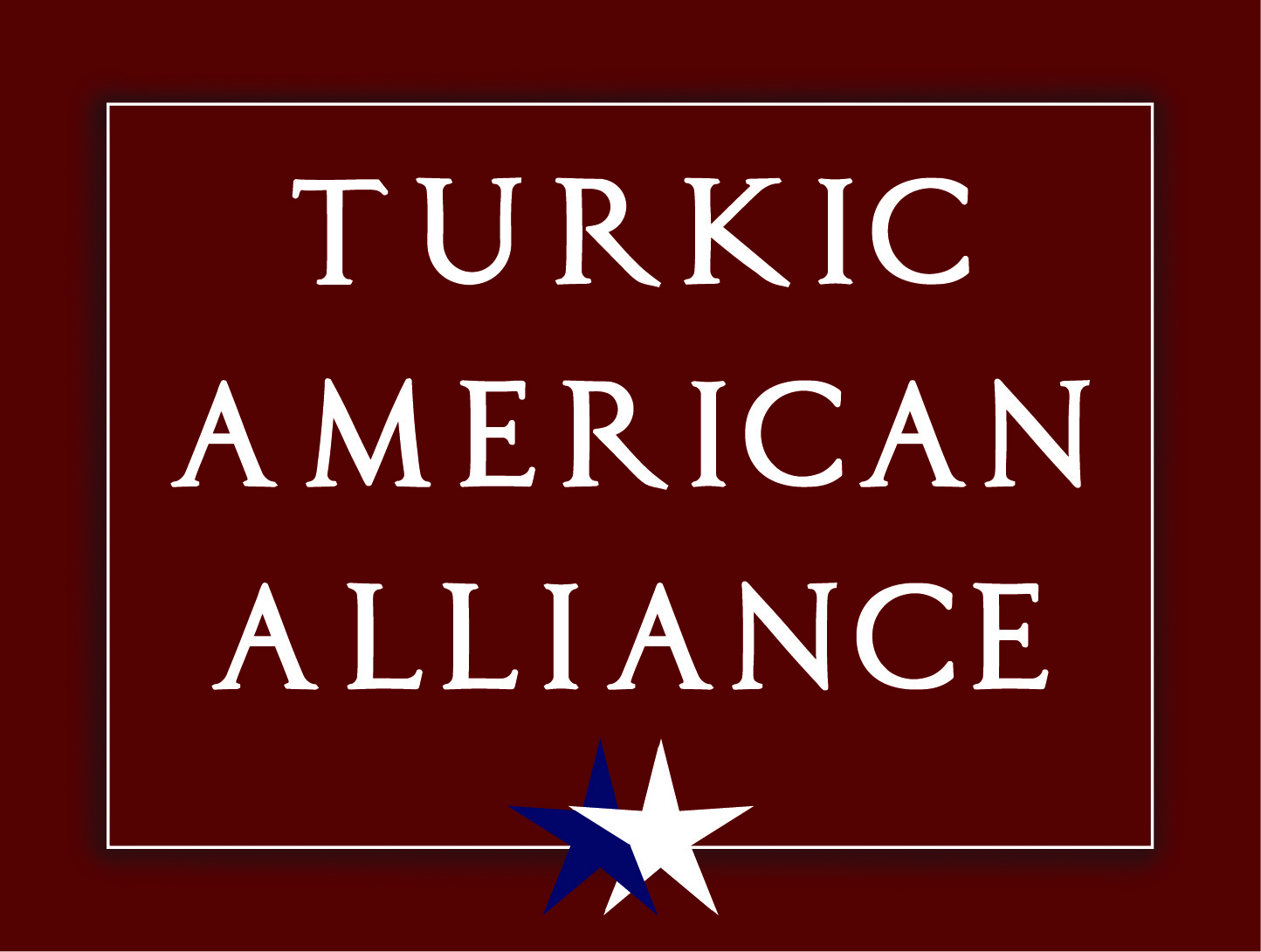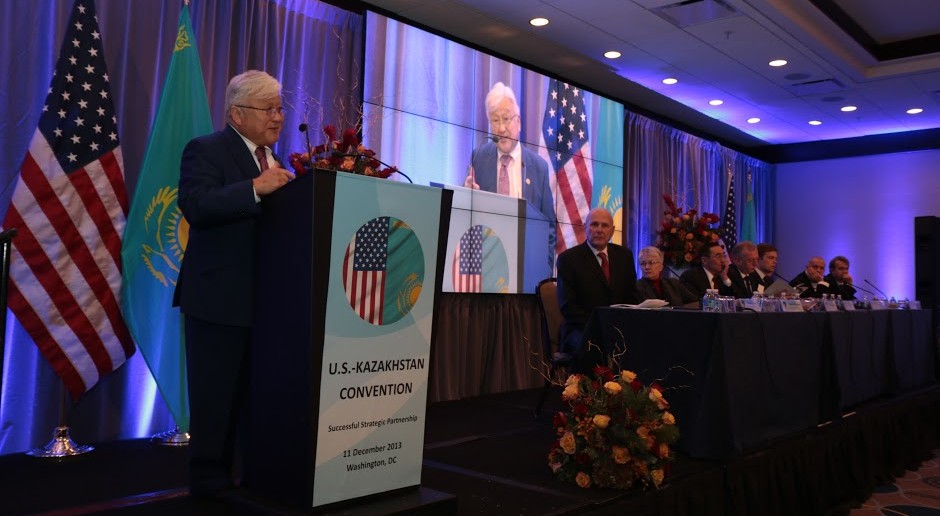Session II of the U.S.-Kazakhstan Convention continued under the theme of “Strategy ‘Kazakhstan 2050’: Long-Term Vision.”
The moderator for Session II was Frederick Starr, Chairman of the Central-Asia Caucus Institute and Silk Road Studies Program at Johns Hopkins University.
Introductory remarks were made by U.S. Representative Robert Aderholt, who is also the Republican Co-Chair of the Kazakh Caucus in the House of Representatives. According to Representative Aderholt, Kazakhstan plays a growing role in the global economy by allowing companies to expand and invest in the region and by deepening and expanding economic cooperation in the fields of energy, manufacturing and industry development. Rep. Aderholt has himself traveled to Kazakhstan and has worked with Kazakh officials, recognizing positive steps taken in areas such as rule of law, civil liberties, religious freedoms and human rights issues. While visiting Kazakhstan, the Congressman remembers how hungry the Kazakh youth were for opportunities to improve their lives and their country and to be a part of a society that emphasizes business, education and the political process. Nonetheless, transitions to representative democracies take time, and in Central Asia this is certainly also the case. As a result, the U.S. has dedicated itself to improving public institutions throughout Central Asia. To close, Rep. Aderholt compared the budget deal that was being rolled out in Congress at that time and compared it to democracy—no one expects success overnight.
U.S. Representative Mike Honda next addressed the audience. Rep. Honda is the Democratic whip in the House and has served 12 years in the House of Representatives and on the Appropriations Committee. Rep. Honda also taught science for 30 years and served in the Peace Corps. The Congressman highlighted the social, political and economic ties between the U.S. and Kazakhstan. Kazakhstan has already proven itself a great leader in nuclear nonproliferation, and as a Japanese-American whose spouse is from Hiroshima, the Congressman understands deep in his gut how extremely critical and significant Kazakhstan’s leadership is. Rep. Honda advised Kazakhstan to find that special spark of innovation and creativity and to think outside the box as the country moves forward in its development and progress. Rep. Honda also suggested that the U.S. take a leaf out of Kazakhstan’s proverbial book in terms of learning multiple languages.
Before the panelists gave their presentations, a short video on Kazakhstan was shown, showcasing the country’s natural beauty, rich history and culture, and contemporary development strategies.
The first panelist was Dr. Kerri-Ann Jones, Assistant Secretary of State for Oceans and International Environmental and Scientific Affairs at the U.S. State Department. Dr. Jones first posed a few questions: Why is science and technology important in a bilateral relationship? Furthermore, how are the United States and Kazakhstan working to strengthen this bilateral relationship? Dr. Jones first suggested that science and technology are important because policies of innovation bring the scientific and business communities together to build partnerships and solve problems. This is especially important as these actors share common values that cut across politics, language and borders through reproducible scientific data that is open and available to everyone. Specifically, however, Kazakhstan has a unique role to play in solving common challenges and shared problems in areas such as health, the environment, and improving the quality of life for its citizens. According to Dr. Jones, “never has science been so important to economic well-being.”
Dr. Jones cited the ongoing collaboration between the Center for Energy Research at Nazarbayev University and several labs at the U.S. Department of Energy, as well as partnerships between Nazarbayev University and distinguished U.S. universities like Duke, Carnegie Mellon, the University of Pennsylvania, the University of Pittsburgh, and the University of Wisconsin. Additional collaborative accomplishments include Kazakh scientists working with researchers at the U.S. Department of Agriculture to develop an experimental Hepatitis C vaccine, and Kazakh scientists with the U.S. Environmental Protection Agency to develop a method to purify mercury-contaminated water.
This past June in 2013, Dr. Jones led a delegation to Astana for the inaugural Joint Committee Meeting under the 2010 U.S.-Kazakhstan Science and Technology Agreement. This agreement established three working groups in the areas of bio-medical research, green chemistry, and natural resources and mineral management. Action plans were developed to identify next steps. One major goal was the development of a green economy in Kazakhstan by 2050. Steps that must be taken in order to achieve this end are reductions in hazardous waste and decreases in water and energy usage. Another major project is the ongoing collaboration between the U.S. Geological Survey and KazGeology to discuss how to share data for managing natural resources and to explore cost effective ways to reduce greenhouse gasses as part of the national climate change strategies for both countries. The third major project is collaboration between U.S. and Kazakh National Institutes of Health to help preserve the ecosystems of a unique plant species found in Kazakhstan that has potential anti-cancer drug components through the establishment of a bio-repository, which would launch Kazakhstan to the forefront of drug discovery and preservation of unique ecosystems.
Additionally, a Memorandum of Understanding was signed between the two countries on Low-Emissions Development Strategies, which will allow both the U.S. and Kazakhstan to cooperate on sustainable, smart growth. Lastly, the U.S. has established a funding opportunity to enable up to ten Kazakh scientists to travel to the U.S. to work on research topics initially identified by the working groups at the 2010 Joint Committee Meeting. During her trip in June, Dr. Jones also had the opportunity to tour the Alatau Technopark, a special economic zone that has already been able to attract major American companies like as Microsoft, Cisco and HP.
To conclude, Dr. Jones encouraged Kazakhstan’s efforts to create an environment conducive to the development of technology, entrepreneurship and innovation. Kazakh innovators can connect with U.S. program like the State Department’s Global Innovation through Science and Technology initiative. They can also encourage U.S. innovation experts and entrepreneurs to travel to the region and share knowledge and experience with Kazakh counterparts. According to Dr. Jones, the U.S. believes strongly in scientific collaboration as the way to bring scientific communities together through linkages of innovative systems
The second speaker was Senator Serik Nugerbekov of the Parliament of Kazakhstan. Senator Nugerbekov listed many of Kazakhstan’s sundry achievements since its independence. For instance, Kazakhstan is dedicated to global issues of religious freedom and even gathered religious world leaders to discuss future collaboration and to develop trust in Central Asia. With regards to Pakistan and India, Kazakhstan hosted a productive set of negotiations that resulted in a positive set of outcomes. With regards to health and the environment, Kazakhstan has dedicated itself to global health and to the environment. It also prepared a final report pursuant to Kazakhstan’s green initiative at the Euro 20+ Summit. Kazakhstan won the competition to host Astana EXPO 2017, a significant international convention dedicated to a number of global initiatives. Kazakhstan initiated the Astana Forum in 2010 as a platform to discuss global economic issues, in particular the global financial crisis, and to issue specific recommendations as guidelines for a global financial recovery. In 2013, the Astana Forum attracted 104 country representatives. For the 2014 Forum, Kazakhstan plans to invite ministers of foreign affairs and heads of national banks to participate. Kazakhstan is also engaged with the United Nations before which it presented research and a report from the Astana Forum and discussed other important outreach initiatives by Kazakhstan. Kazakhstan has also received support from the General Assembly to host a follow-up anti-crisis conference in Astana and to author a resolution document to implement an anti-crisis plan.
With regards to its economy, Kazakhstan is in its second year of a five-year program aimed at major diversification initiatives. In the last two decades since Kazakhstan’s independence, it has attracted $200 billion in foreign direct investment, with the United States taking a leading role. Kazakhstan is also part of the Customs Union, which facilitates customs-free zones and partnerships with Russia and Belarus to move goods freely across its borders. It also provides Kazakhstan advantageous tax preferences for doing business in Russia and Belarus. According to the World Bank “Doing Business in Kazakhstan” indicators, the World Bank has assessed Kazakhstan’s ability to foster a robust investment climate suitable to hosting international companies. By comparison, Russia is ranked 122nd while Kazakhstan is ranked in the top fifties. Senator Nugerbekov also echoed the sentiments of Sandy Merber, Executive Counsel of the General Electric Company, who spoke during Session I. General Electric was first invited to Kazakhstan to participate in the Astana anti-crisis Forum, and a wonderful partnership of investment developed soon thereafter.
Alan Spence, CEO of Newsdesk Media, next offered his presentation. He began by recalling the pervasive fear of nuclear war that enveloped his childhood in England. Understanding full and well this dread, Spence is very happy to see how significant a role Kazakhstan has played in nuclear nonproliferation, despite being a country only 22 years old. Kazakhstan has signed a nuclear nonproliferation treaty and is now a leader in making the world a safer place. Kazakhstan is also a wonderful friend of Britain, the United States, the European Union, NATO and many African countries, but often times they do not give Kazakhstan the credit it truly deserves. As someone from within the media business, Spence credits this phenomenon to a distorted perception of Kazakhstan in Western and international media that is out of touch with the reality in Kazakhstan.
Kazakhstan is a wonderful ally—it has engaged in Steppe Eagle joint exercises with NATO, despite being a post-Soviet republic, and it has contributed immensely to the Northern Distribution Network during war efforts in Afghanistan. Sadly, Kazakhstan is little discussed in the press despite all of its initiatives, which also include communication and engagement initiatives. For instance, Kazakhstan hosts the Astana Economic Forum, an important gathering for securing peace and prosperity in the region as well as globally, and the 70th anniversary of the Bretton-Woods Agreement will be celebrated there. To conclude, Spence described Kazakh youth as hungry for knowledge and so eager to participate in the world at large to become entrepreneurs and to seize opportunities for leadership.
Pavel Chemeris, Senior Representative for the national company handling the Astana EXPO 2017, next took the stage. Chemeris discussed the planning stages and behind-the-scenes preparation already underway for the Astana EXPO 2017. For instance, Kazakhstan is working to reduce its CO₂ emissions and to increase its energy efficiency and accessibility. Chemeris’ main goals are to promote the Astana EXPO 2017 in Kazakhstan and abroad in order to attract 5+ million visits to the premier event. The company is also engaging in tourism development and promotion and is evaluating the EXPO’s global, national/regional and local impacts, in addition to its post-event usage. This is why the company is working so hard to ensure the EXPO city complex is based on a smart and green energy model.
Gordon Gill of Adrian Smith + Gordon Grill Architecture spoke next. One the firm’s partners, Robert Frost, was originally set to speak during Session II, but he was currently in Kazakhstan undergoing negotiations for the EXPO. Adrian Smith + Gordon Grill Architecture currently has 18 buildings under construction around the world in places like China, the Middle East, Canada, South Korea, the U.S., India, Latin America and now in Kazakhstan. The site set for construction in Kazakhstan for the Astana EXPO 2017 is 174 hectares, with the defining symbol the sphere-shaped Kazakhstan Pavilion (24,000m²), located at the center of the EXPO City. For more information about the project, visit Adrian Smith + Gordon Grill Architecture’s webpage here.
The session’s final speaker was Daniel Heller, IMF Executive Director of the Switzerland Group. According to Heller, Kazakhstan maintains the highest per capita income of the Caucuses and Central Asia. It also has a forecast growth rate of 6%. Astonishingly, while in 2001 47% of Kazakhs lived below the poverty line, in 2012 only 3.8% do—a more than tenfold increase. Its oil production and other services have certainly spurred much of this growth. Kazakhstan’s current account deficit is also small because international companies have repatriated less money of out Kazakhstan. Kazakhstan’s national bank has brought down inflation rates to slightly below 6% and maintains a very stable outlook; its exchange rate is more flexible; and 43% of its GDP is comfortably located in foreign reserves. In the banking sector, though growth has returned the outlook still appears somewhat uncertain due to problems related to bad loans and low profitability. Kazakhstan’s growth in credit is at 15%; its loan-to-deposit ratio 108%, which is quite high; and its non-performing loans compose 35% of its loan book, which is also a high number. Nonetheless, Heller praised Kazakhstan for its prudent fiscal policy, which has led to a very low debt relative to GDP ratio at 14%, and has landed Kazakhstan in the top 50 most competitive nations out of 140 countries. Heller suggested that Kazakhstan undertake measures that lead to more private sector activities and reduce the importance of state-owned enterprises.




